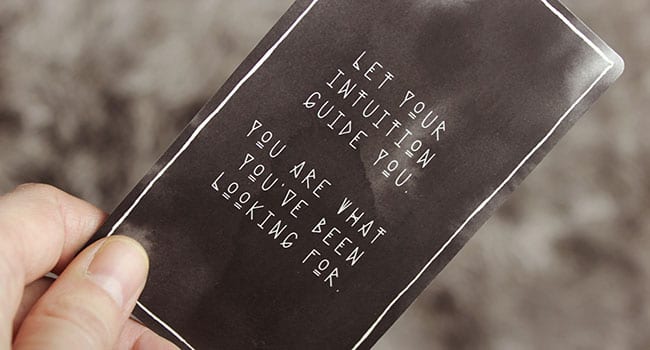 Countless innovators in all fields have cited intuition or gut feeling as the motivator for achieving greatness. Whether it’s a life-enhancing invention, a technology that saves lives or turns out products or machines faster and cheaper, this mysterious feeling called intuition fired the creative spark.
Countless innovators in all fields have cited intuition or gut feeling as the motivator for achieving greatness. Whether it’s a life-enhancing invention, a technology that saves lives or turns out products or machines faster and cheaper, this mysterious feeling called intuition fired the creative spark.
But intuition also triggers hunches that warn us of danger and give us a strange feeling that something isn’t quite right, says Judith Orloff MD, UCLA psychiatrist and author of Second Sight.
Scientists have been studying intuition for decades. A 2009 U.S. Army study concluded that when soldiers learned to tune into subtle signals in their bodies, they made lifesaving decisions faster. And Princeton University researchers found that gut reactions to visual stimuli are faster than visual ones.
Scientists agree that training fine-tunes intuitive reactions. Says Orloff, “Intuition can not only help you make quicker decisions, but better ones.”
Harnessing intuitive intelligence can also be a career asset, according to Orloff.
This was confirmed in a research study at the New Jersey Institute of Technology, which tested hundreds of business managers for intuitive ability. Those who demonstrated superior intuitive ability were also better at effective decision-making skills.
Trust your intuition, it knows what it’s talking about by Faith Wood
A Harvard study found that 80 per cent of surveyed executives credited their success to intuition.
Business luminaries from Conrad Hilton to Bill Gates to Oprah said that intuition was essential for achieving their goals, says Orloff.
The big question is how to tap into intuition in order to excel at your career?
For starters, “you can boost intuitive intelligence by becoming aware of it, tuning in to what it’s trying to tell you, and heeding its advice,” says Orloff. “Like any skill, the more you practice it, the easier it becomes.”
Orloff says the following four tips can harness intuition to achieve career goals:
1. Obey body signals. Perhaps your stomach clenches up when a certain coworker leans into your cubicle. Or you’re anxiety level increases when asked to be the designated scribe at the weekly department meeting. These are your body’s way of telling you something important, warns Orloff. Listen to these subtle urges and hints. You may find out that the coworker has been bad-mouthing you, or that you have a sought-after talent for writing.
2. Pay attention to dreams. Our dreams often tell us, usually in symbolic code, what’s happening in our lives. Keep a notebook and pen by your bed so you can jot down your dreams when you get up in the morning.
3. Coincidences can be meaningful. Sometimes life presents moments of clarity in the form of coincidences. These can be powerful teaching moments. For example, you’ve been thinking about changing jobs when you bump into a long-lost friend who tells you about a dream job that’s opening up. Don’t let such precious opportunities pass you by. Such synchronous events are signals that you are in the right place at the right time, or that you need to stop and pay close attention to what’s in front of you.
4. Tune into intuitive empathy. This occurs when you “pick up a vibe” from another person. For no apparent reason, you suddenly feel hostility coming from a boss who is grinning at you, or you sense that a coworker is hiding something. “This innate sense that we all have can be fine-tuned by becoming aware of it,” Orloff adds. “It will alerts you to danger – a bully boss who has decided to scapegoat you, or a coworker who made an accounting error and is now trying to cover her tracks.”
Dana Wilson is a freelance writer.
The views, opinions and positions expressed by columnists and contributors are the author’s alone. They do not inherently or expressly reflect the views, opinions and/or positions of our publication.


